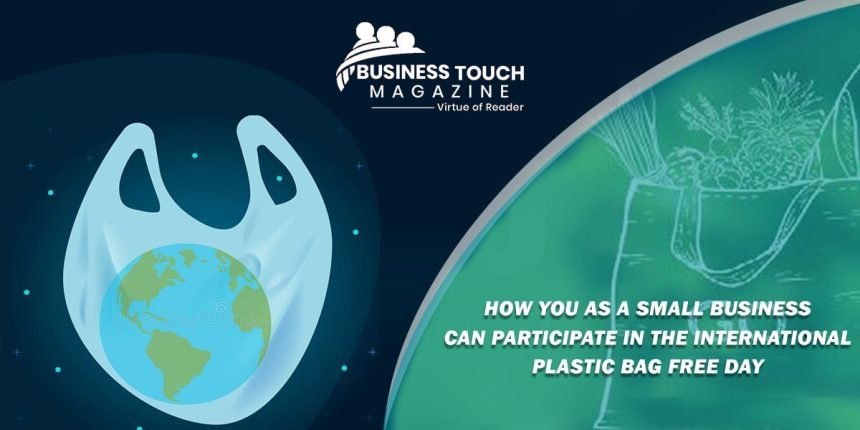Choosing a promotional bag will help you choose a shopping bag that will benefit your customers, promote your small company, and have the least number of negative effects on the environment. Happy clients and a successful company may be yours as you work to reduce plastic pollution on this International Plastic Bag Free Day.
What Is International Plastic Bag Free Day?
International Plastic Bag Free Day, observed annually on the third Saturday in July, aims to raise awareness about the dangers of using single-use plastic bags. Today’s mission is to reduce plastic pollution by removing thin, filmy plastic bags used in retail and grocery establishments. This year’s International Plastic Bag Free Day aims to show that a world free of single-use plastic bags is a reality.
As part of the Break Free from Plastic initiative developed by Zero Waste Europe in 2009, International Plastic Bag Free Day was created. Nearly 6,500 people and over 2,400 organizations were part of the movement by 2020. Solutions to plastic pollution are being sought by this movement. Environmental, human, and animal welfare are all priorities of the program.
What Is a Single-Use Plastic Bag?
Most of the chemicals used to make single-use plastic bags are derived from fossil fuels (petrochemicals), and they are intended to be thrown away as soon as they are used. Single-use plastic bags are made from polyethylene, a thin material that was discovered by accident over 80 years ago in England. In 1965, disposable plastic bags began to replace cloth and heavier plastic bags in Europe, and by 1979, they had migrated to the United States and other nations. To go shopping, a single-use plastic bag had almost completely taken over from a paper bag by 1989 worldwide.
Why Is Reducing Plastic Bag Use Important for the Planet?
In terms of the environmental effect of single-use plastic bags, figures speak for themselves:
• In a landfill, plastic bags decompose in between 100 and 1,000 years. How many generations will inherit our trash?
• Instead of decomposing, plastic bags often undergo photo-degradation, resulting in microplastics that absorb poisons and contaminate the environment indefinitely.
• An estimated 500 billion plastic bags are used each year across the world’s population (up to five trillion are produced). As soon as it’s out of use, a single-use plastic bag pollutes the environment for up to a thousand years before becoming trash, when it starts its real life cycle (see first bullet).
• Approximately 12 million barrels of oil are needed to produce 100 billion plastic bags in the United States each year. 14 single-use plastic bags consume the same amount of oil as it would need to travel one mile.
• Plastic bags are never recycled at the proportion of 87%.
• Plastic in the world’s seas might outweigh fish by weight by 2050.
• Single-use plastic bags may contain endocrine disruptors, which have been linked to malignancies, birth deformities, and immune system suppression in people and animals, as well as environmental harm.
Bags made of single-use plastic have a negative impact on animals, the environment, and human health. It’s a fantastic idea to look for alternatives!
Plastic Bags: Where’s the Good News?
Local, national, and global awareness of what we can and must do is so high that action is being done everywhere. As the manufacture of single-use plastic bags gives way to our shared passion and need for clean air, clean water, and healthy plants, animals, and people, momentum is only rising. Here are a few facts about the progress:
• Earlier this year, California banned single-use plastic bags, making it the first state to implement such a restriction.
• Local governments in 24 states, including Hawaii, have passed 311 anti-single-use carryout bag laws by 2018.
• Single-use plastic bags have been outlawed in at least 127 countries throughout the world by the end of 2018.
• The typical American uses 365 plastic bags each year. Sadly, the following is bad news: The average number of plastic bags used by residents of Denmark is four per year. Give a round of applause to the Danes and follow their example; it can and is being done!
• More than 127 of the 192 nations studied by the United Nations Environment Program (UNEP) have implemented some type of legislation to address the issue of plastic bags.
• In 2020, China pledged to increase national efforts to combat plastic pollution, ushering in a new age of reduced use of single-use plastics.
Isn’t this the finest news of all? Clearly, the “emperor” has no clothes, or at least less garments, when it comes to plastic pollution. Single-use plastic reduction is one of several worldwide, cultural trends toward more sustainable living. Correction takes time, too, just as the plastic bag crisis grew over decades. In the midst of the restoration process, little steps and individual transactions are yielding big results.
How Can My Small Business Make an Impact?
We all have the opportunity to make a difference! You may do so by :
• Providing customers with re-usable bags.
• Doing away with plastic bags that may only be used once.
• Educate your consumers about International Plastic Bag Free Day by asking them to bring their own bags or not use plastic bags at all.
Being a part of the solution is a great feeling! Customers will appreciate your efforts to make it easy for them to say “no thanks” to plastic pollution by making it simple for them to get involved.
What Are the Branding Benefits of Reusable Bags?
It’s a great opportunity to help out customers and visitors while supporting a cause that improves everyone’s quality of life. Reusable bags are a great way to interact with consumers while also promoting your brand. In two ways, customizing an eco-friendly bag or tote has long-term benefits: first, the advertising effect lasts longer, and second, your business connects with customers on a subject that matters to them.




